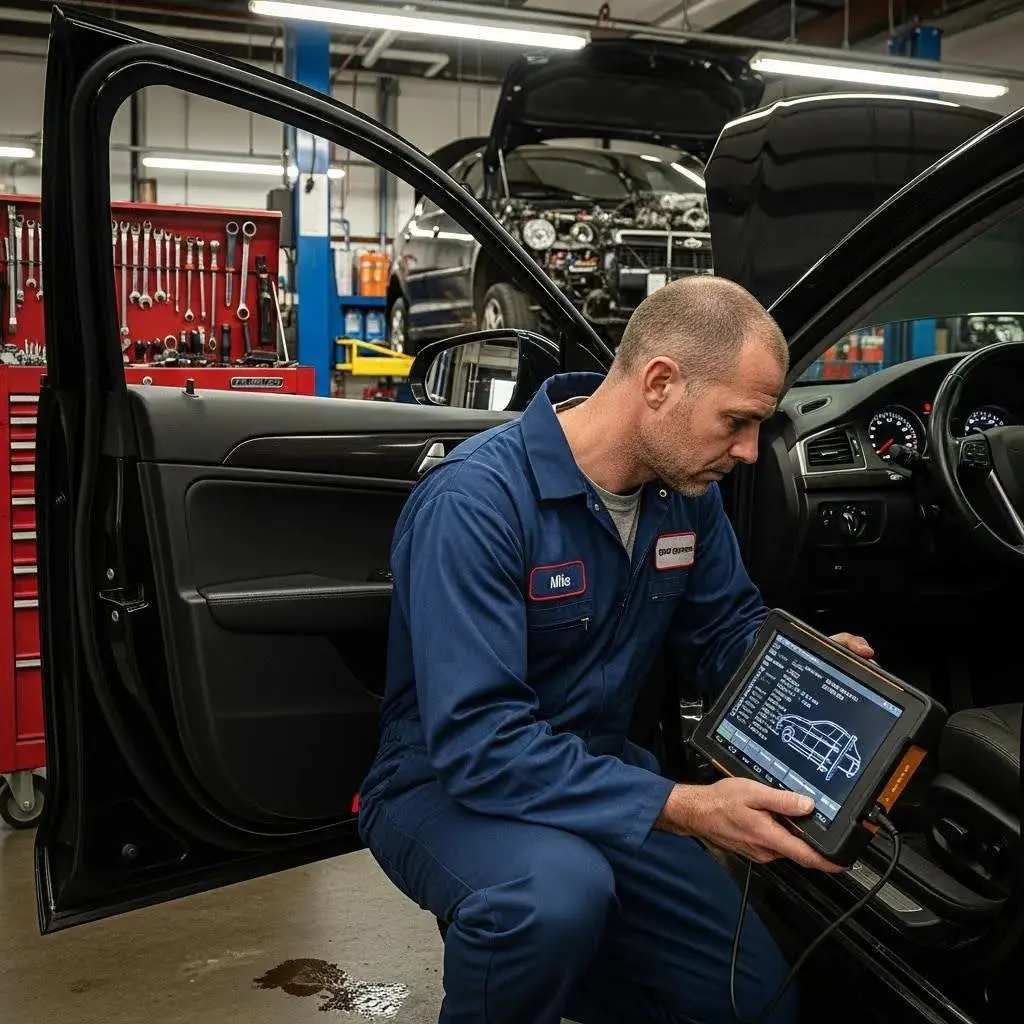As a responsible driver, you must be proactive in maintaining your car and ensuring that any potential issues are identified and dealt with promptly. MOT tests are an important part of this process, as they allow you to have confidence that your vehicle is safety compliant and road-worthy – but knowing when to book one in can be tricky. In this post, we’ll answer the common question, “when will a new car need its first pre-arranged MOT test?” by exploring what exactly an MOT test is and providing guidance on when these checks should occur for different-age vehicles. Read on to discover all the information about MOT testing for peace of mind during your next drive!
Are you Driving an Older Car and Wondering When your First MOT Test is Due?
Having your vehicle checked by an expert annually can help keep it in top condition, give you peace of mind, and protect other road users. It’s important to understand the rules around cars that need a valid MOT certificate under UK law. New car MOT requirements UK state that vehicles must undergo their first MOT test after three years from the date of registration. Ensuring your car meets these regulations not only guarantees compliance with the law but also enhances safety on the roads. Regular maintenance and timely inspections are key to identifying potential issues before they turn into costly repairs.
With our helpful guide, we make it easier than ever to check if your car needs an MOT test or not, as well as help you understand exactly what the tests are designed to check for. We’ll also provide tips on preparing for the test so you can pass with flying colours!
What is an MOT Test?
MOT stands for Ministry of Transport, and it is an annual test that all cars over 3 years old need to take to ensure their roadworthiness. The MOT test checks for general safety and emissions standards and can include checking the following:
- Brakes.
- Steering.
- Exhaust system.
- Tires.
- Windscreen wiper blades.
- Headlights.
- Indicators.
If any of these elements fail the test, then repairs or replacements may be necessary to pass. The MOT also checks for any major problems with the vehicle, such as rust or corrosion, that could impact its safety and roadworthiness.
After passing an MOT Test, a vehicle will receive a VT20 certificate which proves it is legally compliant with the relevant safety regulations. It is important to remember that this certificate only confirms the car is safe to drive on the road at the time of testing and cannot guarantee its future condition. Regular maintenance is essential to keep your vehicle safe and roadworthy all year round.
Here are the Reasons why you need an MOT Test:
- To keep your car safe and legal to drive on the road.
- Identify potential faults in your vehicle that could be dangerous or lead to additional costs.
- To adhere to UK law, which requires cars over 3 years old to have an annual MOT test for safety and compliance.
- To help you save on insurance costs, having a valid MOT certificate is often a requirement of some insurers.
- Ensure that your vehicle meets the necessary environmental standards for emissions and air quality.
These are just some reasons why an MOT is essential, so make sure you book yours regularly to stay on the right side of the law.
The Important Factors of The Car’s Registration Date
When it comes to having your car MOT tested, several important factors need to be considered. One of the most crucial is determining the registration date of the vehicle. This will help ensure that a valid and up-to-date test can be conducted to keep your car on the road legally and safely.
Here are the important factors to consider regarding your car’s registration date and MOT test.
Age of Car
Depending on the age of the vehicle, different tests may be required for it to receive a valid MOT certificate. Generally speaking, cars three years or older must have an annual MOT test conducted for the vehicle to remain roadworthy.
Mileage Accumulated
During your car’s annual MOT, the garage will create an official record of its mileage. For cars with higher mileage, it may be necessary to have an earlier test conducted to make sure all parts are still functioning as they should. Adequate maintenance is necessary to keep cars in good shape.
Exemption Periods
The UK government exempts all vehicles that were constructed or first registered 40 years ago on a rolling basis from roadworthiness testing. A basic roadworthiness test might be required for these vehicles instead of a full MOT.
Modifications
You are required to disclose any modifications made to your car when presenting it for its MOT. This is to ensure all modifications are safe and compliant with current regulations.
By taking into account the registration date of your vehicle, as well as these other important factors, you can ensure that your car is up-to-date and roadworthy for many years to come.
How do I get an MOT Certificate?
If you want an MOT certificate, you will have to follow these steps:
- Schedule your MOT appointment conveniently through AVS online booking service today.
- In case you are uncertain about the MOT class that you need, please do not hesitate to contact us at 01795422040.
- Bring your car to the centre for testing before the appointment time to assess its condition and ensure it meets all the legal requirements to obtain an MOT certificate.
- Once the test is complete, you will be issued a certificate if the car meets all necessary standards.
- Keep your MOT certificate safe, as you may need it to renew your car insurance or if you decide to sell the vehicle.
Following these steps should ensure you get your MOT certificate and can legally keep your car on the road.
Which Vehicles would be Exempt from MOTs?
Certain vehicles will be exempt from needing an MOT, including:
- Vehicles Registered as Historic Vehicles: These must be at least 40 years old and have not been substantially changed from the manufacturer’s original specification.s.
- Motorcycles over 40 years: Motorcycles over 40 are exempted from yearly MOT tests, provided they’ve not undergone so much modification.
- New Cars: Cars under three years old will be exempt from needing an MOT until the fourth anniversary of their registration.
- Tractors: In the United Kingdom, tractors are exempted from having to undergo an MOT test. This exemption applies to tractors that are used solely for agricultural purposes.
- Goods Electric Vehicles: Electric-powered goods vehicles are exempted from MOT, but they must be registered before 1 March 2015.
- Vehicles Used by Police: Police vehicles that are maintained in an approved workshop are exempted from needing an MOT test.
- Others: Other vehicles exempted are track-laying vehicles, work trucks, and private hire vehicles.
These exemptions do not mean that vehicles can be driven without meeting certain safety standards, as vehicle owners are still legally responsible for ensuring their car is roadworthy and safe to drive. If a vehicle is deemed dangerous or unroadworthy, it can still be stopped by the police and action taken against its owner.
Tips on How to prepare my car for an MOT test?
Preparing your car for its MOT test is an important step in ensuring it remains safe and roadworthy. Here are five tips to help you get ready:
- Check your Lights, Brakes, Tires, and Windows: Ensure all exterior and interior lights are working properly, that the brakes don’t pull or squeak when activated, and that the tires have at least 1.6mm of the tread to be deemed roadworthy. Additionally, check that all windows are free from cracks and chips, as they must meet minimum standards.
- Check your Fluid Levels: Engine oil, power steering, brake fluid, and transmission/gearbox should all be checked according to the vehicle’s manufacturer guidelines and topped up to the required levels.
- Check for Corrosion: This is particularly important in areas where water can collect, like around wheel arches, door frames, and the car’s underside. Any exposed metal should be treated with rust-proofing or anti rust paint to ensure it is in good condition.
- Have your Documents Ready: Your vehicle’s logbook (V5C), a valid MOT certificate, and insurance details should all be checked before the test and taken with you on the day of the MOT.
- Service your car Beforehand: Regular service is recommended before an MOT, as any underlying issues can be identified and addressed before the test, helping to ensure it passes.
By following these tips, you can help make sure your car is ready for its MOT and that it passes with flying colours.
Frequently Asked Questions about When Will a New Car Need its First MOT Test?
Q: Why an MOT test after 3 years?
A: A new car will need an MOT test three years after registration. This is the government’s requirement. It ensures that all cars on the road are fit for purpose and safe for drivers and passengers.
Q: What happens if my car fails the MOT?
A: If your car fails its MOT test, you can have the necessary repairs and then re-present your vehicle for testing. Depending on the severity of the issue, you may be able to drive your car away from the test centre if it meets certain conditions.
Q: How much does an MOT test cost?
A: The cost of an MOT will vary depending on the type of car and where you get it tested.
Final Thoughts
When your car is due for an MOT, it’s important to start the process MOT earlier. Book the test with a reputable garage and allow plenty of time before its MOT expiry date. During the inspection, you can expect a thorough examination of all components from brakes to exhaust systems – so make sure everything is in good condition beforehand.
This post has given you a better understanding of what occurs when your car goes through an MOT. If you know what to expect, the process should be less daunting and more straightforward.



